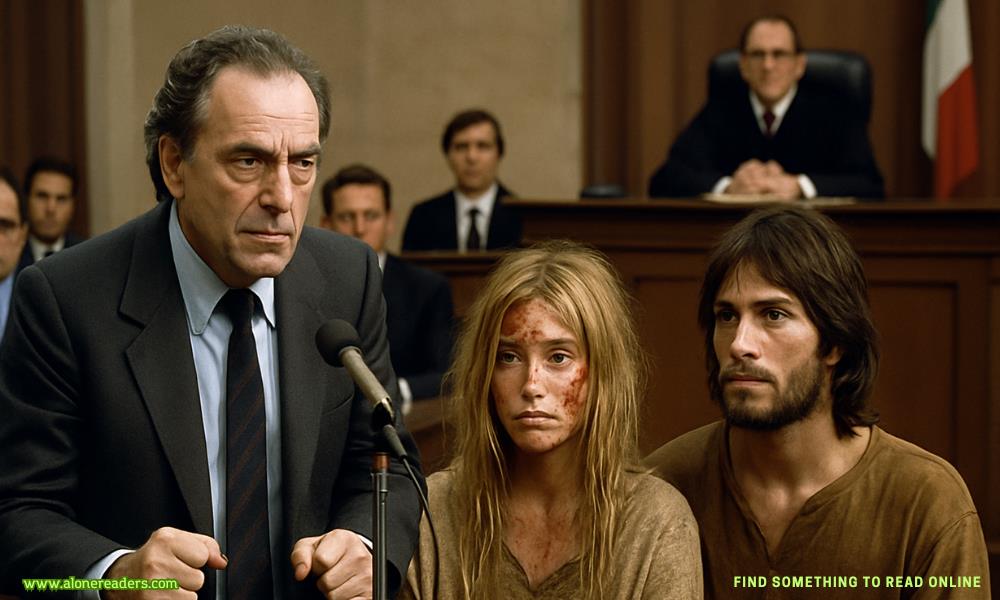Page 77 of Killer on the First Page
The wheels in Miranda’s head were turning. Inez had reinvented herself. They all had...
“Kane Hamady’s real name was Nigel,” Miranda said. “He was British. That’s why his voice changed when he locked himself inside the reading room, trying to solve the riddle. Under the stress of the moment, his original accent emerged.”
“It started as an exercise in voice and POV,” said Cephus. “But it took over their lives. Ross was always playing with people’s lives. We were like characters in a story orchestrated for his own amusement.” His smile turned cruel. “Officer, I don’t know who killed Kane or Fairfax, but I can tell you who’s next.”
“And who might that be?”
He tapped a finger on one of the faces in the photograph: Penny Fenland.
“I’ll be drawing an X through her soon enough, I suppose.”
“And why is that?” Ned asked, voice flat. Killers often telegraphed their intentions.
Cephus leaned back on a terse smirk. “Because she knows too much. In any circle of friends, some will always be closer than others.Kane, Fairfax, and Penny? They were thick as thieves. Look how near they’re sitting to each other in this photo, practically in each other’s laps, limbs hooked in limbs, fingers entwined. Look at how Inez is off to one side, barely part of it, on the outside looking in. Kane was always dismissive of Inez for the freak she was. As for Ray Valentine and myself, we began as friends, good friends—best friends, even—until Ray betrayed me.”
“And Wanda Stobol?”
A shrug. “She wasn’t close to any of us. But unlike Inez, she didn’t care. Couldn’t make it as an adult author, chose the children’s route instead.”
Ned pointed out, “Be that as it may, Ms. Stobol has been published. Successfully, too. But you never were, were you, Mr. Kudarc-Vesztes? That must rankle. Seems if a fellow was looking for motive, that’s where he’d start.”
“Please,” he said, his voice splintered with ice. “Call me Cephus.”
“Kane Hamady, aka Nigel—he really was a III!” said Miranda. “Nigel Hawthorne III. Fairfax DePoy, meanwhile, was just an unnumbered kid from Jersey named Frankie. Kane and Fairfax—or rather, Nigel and Frankie—swapped lives!”
“That’s exactly right,” said Cephus.
“When did it sour? When did they cross the line to become mortal enemies?”
The janitor balked at this. “Enemies? They were never enemies.”
The news was like a thunderclap. In that moment, everything made sense: the locked door, the open transom, the creases in the page.
“We have to go back!” she cried.
“Where?” Ned wanted to know.
“To the Murder Store!”
But Ned refused to be hurried. He first took down Cephus’s statement on his whereabouts last night. It was a plausible alibi, thoughone that would need checking: Cephus had left the reception early to be on custodial duty for a local ladies’ social do, which ran late, as they always did (no one drank like the Tillamook Ladies Cultural Society). He’d locked up after they left. Witnesses would attest to that.
Only then did Ned allow himself to be pushed along by Miranda.
“We’re not exiting through the side door,” he admonished. “We’ll take the lobby like normal people. And anyway, Andrew is meeting me out front.”
Chapter Twenty
Melvin “J”
Ned Buckley escorted Miranda out of the Opera House via the main doors, securing the lock behind them and then stepping out into the clear, cold sunlight of the inner harbor. The air had the crispness of an apple being bitten. Miranda took a deep, satisfying breath. But before she could put her thoughts in order, she was accosted.
“Wait! I need to speak to you.” Scoop Bannister, jaywalking with impunity, ran across Harbor Road toward them, waving her notepad like a semaphore.
Damn paparazzi!
“No comment!” said Miranda, striding away, chin up.
But Scoop wasn’t interested in her. Unbeknownst to Miranda, the publicist Sheryl Youngblut was cutting across from the opposite direction. That was who the reporter was trying to intercept.















